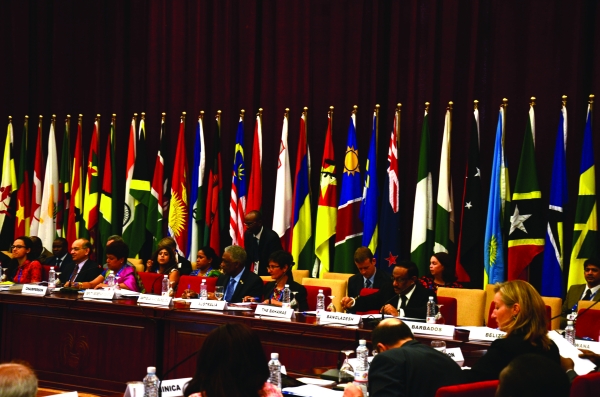Civil society needs more opportunities to engage with foreign ministers during CHOGM if the Commonwealth is serious about reaping the benefits of the work done by these organisations

Every two years, the Commonwealth gathers for reasons of politics and fellowship under the banner of a Heads of Government Meeting – known to all as CHOGM. But there is concern that this once highly valued event has lost ground in an increasingly crowded and competitive multilateral calendar. CHOGM reform is on the agenda.
The Commonwealth Foundation’s interest in CHOGM reform stems from its role as a facilitator of civil society inputs to Commonwealth political processes. In this capacity, the Foundation has brought civic voice to several Commonwealth ministerial meetings over the past 20 years, most notably Education, Finance, Health and Women’s Affairs.
The principal engagement, however, has been with CHOGM. This started after civil society organisations took themselves to Harare prior to the CHOGM in 1991. This prompted the Foundation to support an NGO forum in Auckland in 1995 and it has been present in the wings of CHOGM ever since. CHOGM has attracted interest from civil society organisations and the Commonwealth has responded, deploying the Foundation to manage the process.
A discussion on reform of the CHOGM process comes at a time when there is considerable interest in the ways in which institutions engage with citizens. In response to demands for citizen dialogue, global institutions have responded incrementally, but these initiatives have generally been seen as unsatisfactory by civil society and its advocates.
The Commonwealth is part of that global system, but aspires to a set of values and principles that speak to human dignity and sustainable development. The Commonwealth started to open up to civil society inputs in the early 2000s. The 2005 CHOGM in Valletta provided an opportunity for dialogue between civil society and foreign ministers, and provision for civic voice started to be made in a succession of ministerial processes. The Commonwealth Women’s Affairs Ministerial Meeting went so far as to make provision for every seventh speaker to be from a civil society organisation.
Heads of government endorsed the trend in paragraph 77 of the 2007 CHOGM Communiqué: “Heads of government welcomed progress involving civil society in all aspects of the Commonwealth’s work. They noted that a number of ministerial meetings now included provision for dialogue with civil society and called for this to be extended where possible.”
Heads also acknowledged the need to look again at Commonwealth ministerial processes as a whole and in 2009 a review was called for that would “examine inter alia the format, frequency and content of Ministerial meetings in order that these continue to support the Commonwealth’s values and principles, and provide the greatest possible addition of value and cost effectiveness”. The resulting rationalisation has, if anything, constricted the opportunities for civic engagement with Commonwealth ministerial processes.
Finance and Health ministerial meetings, in particular, no longer provide meaningful opportunities for dialogue with civil society. At CHOGM, the space afforded to civil society to engage with foreign ministers has been eroded. Indeed, civil society organisations have consistently asked for time with heads of government commensurate with that set aside for engaging with young people, but this has been to no avail.
This brief review shows that the Commonwealth has fallen short of its stated commitment to meaningfully engage civil society. Rather than progressing down this road, it has actually retreated. In turn this has led to hard questioning on the part of civil society organisations (those accredited to the Commonwealth and the broader community) as to the value of engaging with the institution.
The Foundation’s contribution to the debate on CHOGM takes as its starting point a number of requirements that enable meaningful civil society engagement. These have been developed following reflection on the experience of bringing a civic voice to Commonwealth ministerial meetings (including CHOGM 2013) over the past two years:
Civil society should be in the lead role when developing the agenda and the design of the process and methodology for the engagement
A participatory process should be followed in the design, implementation and post processes of the engagement
The engagement should be owned by civil society organisations in the host country and broader partner civil society networks across the Commonwealth, with support from the Foundation
Civil society should have access to relevant government ministries and decision makers
A consultation process that is inclusive, allows time for feedback to participants, and integrates monitoring and sharing of results should be central to the design, implementation, delivery and assessment of the engagement
All parties should have timely access to relevant information
The host government (where relevant) needs to guarantee a space for dialogue and engagement
If these requirements are going to be made operational, the Commonwealth needs to reaffirm its commitment to the meaningful engagement of civil society in the CHOGM process. The host government also has a key role to play in creating the conditions for civic engagement with CHOGM and the Foundation has been greatly encouraged by the government of Malta with regard to CHOGM 2015. With this kind of commitment, new and improved moments for dialogue between policy makers and civil society can be realised.
A reflection on recent CHOGMs suggests that the nature of the event is changing from a forum focused on drawing its own conclusions to a gathering that provides space for deliberation and consensus in the context of other global processes, for example, related to climate change or the post-2015 development agenda. This is an important contribution to multilateralism and one that highlights the need for processes that add value to discussion and debate. Civil society is an asset in this regard, but its inclusion in CHOGM processes is in need of urgent review.





